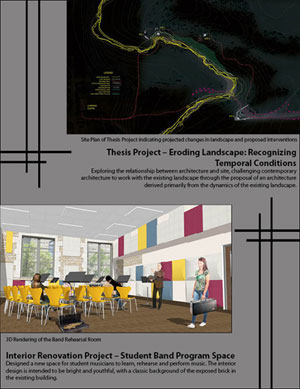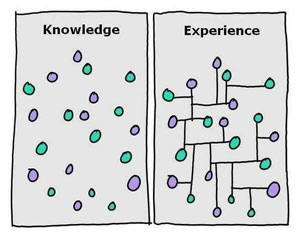
By Nadine Pearson, Architectural Intern

You have just received your master’s degree, and now you are headed to your first interview with confidence levels through the roof. After all, that piece of paper claims that you are a master… right?
Have you ever spent hours or days preparing for an interview, with parchment papers still hot off the press, only to listen to your interviewer rant for 30 minutes about how, in their opinion, your school didn’t provide you with the skills or knowledge that they expect from a graduate? I have.
Over the last several months, I have been grappling with the joys and struggles of making the transition from a university education to a professional career. It truly is a roller coaster of experience and emotion, successes and failures. I recently graduated with a Master’s Degree in Architecture, and managed to land an internship here at Number TEN. My time here so far has been filled with excitement, but also moments of anxiety. What do my employers expect me to know? Granted, this profession, like most others I’m sure, contains an infinite amount of knowledge to be learned over the course of a career. Even the most experienced architect probably doesn’t have all the answers. However, I assume that there is a base set of knowledge that a graduate should have when setting out to transition from their education into their career – but what does this base set of knowledge consist of? Does it depend on the type of school I went to? Do the expectations differ from employer to employer? I haven’t found a handbook of answers yet.
 So far, I have found my experience in the workplace to be much more positive than my experience in school. A “thank you” or “great job” for a job well done goes a long way to boost one’s morale, which might explain why I often felt dissatisfied with my work at school. Comments like these usually came after deadlines, if they came at all. When comparing my experiences at work and school, the mentoring relationships are radically different. In school, individual work dominated each term, aside from the twice-a-week visit from the advisor and the occasional group project. At the office, it is a constant collaboration within a team of diverse people. I think this way of working makes the transition easier, as the work lies on the group as a whole, not the individual, and the mentoring happens much more naturally.
So far, I have found my experience in the workplace to be much more positive than my experience in school. A “thank you” or “great job” for a job well done goes a long way to boost one’s morale, which might explain why I often felt dissatisfied with my work at school. Comments like these usually came after deadlines, if they came at all. When comparing my experiences at work and school, the mentoring relationships are radically different. In school, individual work dominated each term, aside from the twice-a-week visit from the advisor and the occasional group project. At the office, it is a constant collaboration within a team of diverse people. I think this way of working makes the transition easier, as the work lies on the group as a whole, not the individual, and the mentoring happens much more naturally.
I have discussed my concerns with a few of my classmates who are also transitioning into the workplace. Their experiences appear to be fairly similar, though it is clear that the employer makes quite a difference in the success of the transition. A good friend and fellow intern has noticed a difference in atmosphere between the university and the office in the same way as I have. Furthermore, he shares my concerns that our school did not adequately prepare us for the profession. In order to be an asset to a firm, we felt that we needed to take it upon ourselves to fill in the gaps. My friend is currently working for a firm that he had previously worked for as a student. However, he has been struggling with making the transition from student to intern within the firm.
“You would think that graduating with a Master’s degree would make you valuable to a firm but the reality is you are no more valuable with a Master’s degree than with an undergraduate degree; at least not without any extra experience. It is very discouraging for any recent graduate to put the next step on hold as a firm evaluates your value to them as a permanent employee.”
It certainly must make the transition much harder if the employer does not appear invested in you; it can only add to the anxiety that a graduate experiences throughout their transition.
With these concerns looming over me like a cloud, I set out to get a few answers from some employers. What skills are considered most valuable in a graduate? How much weight does the degree carry when compared with experience? Here is what I found:
Employers can quickly gauge an applicant’s communication skills in an interview. As a graduate explains their resume and portfolio, the ability to communicate (or lack thereof) becomes quite clear.
 Interview advice:
Interview advice:
- Prepare your interview materials carefully and thoroughly so that you can use them to keep you on point when describing your work and experience.
- It’s easier said than done, but you need to relax. If you are too nervous in the interview to communicate effectively, the interviewer may develop concerns about your ability to confidently work with clients and deliver presentations.
The resume and portfolio that a graduate brings to the interview can demonstrate whether the graduate possesses important skills and personality traits such as communication, creativity, open-mindedness, and attention to detail while maintaining an understanding of the “big picture”.
Resume tips:
- Keep your resume clean and concise to demonstrate efficiency in communication, and take time to provide well-written descriptions to show that you can communicate effectively and professionally.
- Get someone to proofread it for you – the last thing you want is your resume to say that you have “excellent compuper skills”.
Portfolio tips:
- Show attention to detail:
- Keep photos and text aligned
- Use a bold, larger or different font to emphasize headings
- Give your photos/images a caption
- Keep a consistent formatting on all pages (text style, headings, borders, etc...)
- Organize your information to communicate effectively:
- Keep text concise and to the point. Your interviewer won’t have time to read a novel, and this will demonstrate that you can prepare material appropriately for each situation.
- Strategically place your strongest work at the beginning and the end; your interviewer will more likely remember these than anything in between. Your work doesn’t have to be shown in order of completion.
- Add a bit of personal touch to show your creative side, but just a little bit! You want to demonstrate that you do have a unique personality, but you don’t want to take attention away from your work.
 A graduate who holds both a degree and related experience demonstrates a higher potential to excel as they have already demonstrated an interest in the fundamentals of their chosen career path, as well as a dedication toward growth in their prospective field. Therefore, a degree is not necessarily a golden ticket into the professional world, if it stands alone on your resume. Furthermore, a graduate with related experience will likely be aware that school does not necessarily teach all aspects of the profession. My school put a huge emphasis on the design process; even though a professional architect might spend 10% of his/her time actually designing. This can come as quite a shock to graduates who have never worked in the field prior to graduation.
A graduate who holds both a degree and related experience demonstrates a higher potential to excel as they have already demonstrated an interest in the fundamentals of their chosen career path, as well as a dedication toward growth in their prospective field. Therefore, a degree is not necessarily a golden ticket into the professional world, if it stands alone on your resume. Furthermore, a graduate with related experience will likely be aware that school does not necessarily teach all aspects of the profession. My school put a huge emphasis on the design process; even though a professional architect might spend 10% of his/her time actually designing. This can come as quite a shock to graduates who have never worked in the field prior to graduation.
My Advice:
- When looking for summer work, go for paid and/or volunteer positions that relate to your field. I chose to work as a labourer for a construction company, while some of my classmates volunteered to build houses with Habitat for Humanity. Any job can help you build generic skills, but these jobs will help build your knowledge at the same time.
- Do your research! Go beyond what your professors assign to you to find out exactly what is involved in your future profession. This research will also give you an idea of the types of summer jobs that will be appropriate.
- For students still in school who have the freedom to choose their projects and methods of delivery, aim to produce work that can be directly translated to employable skills, and use methods of delivery that are industry standards. This will help create a stronger body of work within your portfolio. For example, an architecture student could use Revit to produce drawings instead of drawing by hand, as hand drawing, though it can be done beautifully, is no longer an industry standard.
- Grades tend to have more weight in University than in an interview. I’m not suggesting that students shouldn’t care about their grades, but I don’t remember having to provide any transcripts or grade point averages to my interviewers. Good grades are important for scholarships and advancement to further degrees and programs and also speak of your hard work and dedication, but grades alone, like the degree, will not guarantee a successful interview.
I am grateful that I have had opportunities throughout my educational career to further my growth as a future architect, and thankful that I took advantage of these opportunities. This transition is certainly a learning experience, but I still have my insecurities – and it is clear that I am not alone. Perhaps these concerns aren’t a terrible thing, because it is proof that I care and it keeps me on my toes! My best advice for students preparing for the “real world”, aside from completing the necessary degrees, is to take advantage of and seek opportunities outside of their education to gain some experience and knowledge. If you work hard enough, the transition will be successful and will only help you grow as a professional.

